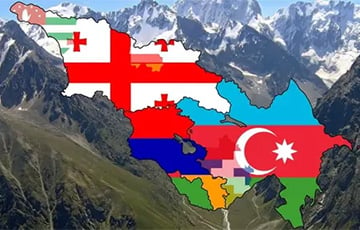The Economist: Russia Has Lost Influence In A Region Where It Has Ruled For 200 Years
11- 11.07.2025, 19:44
- 10,022

This can truly be considered a defeat of historic proportions.
The cost of armed aggression against Ukraine continues to rise for Russia. And it's not just about dead soldiers and economic losses, but also about the loss of geopolitical influence. One of the most important consequences of the war in Ukraine for Russia has been the loss of influence in the South Caucasus, writes The Economist.
The South Caucasus, or "Transcaucasia" in Russian terminology, is a relatively small in area and population, but geopolitically very important region, which is currently occupied by three states - Georgia, Azerbaijan and Armenia. As the author of the publication notes, this region between the Black and Caspian Seas, Europe and Asia, is located at the crossroads of old empires: Ottoman, Persian and Russian. And today it remains important.
"Mr. Putin's war against Ukraine has inadvertently brought an end to the hitherto intractable conflict between Azerbaijan and Armenia, which is now trying to break free from Russian influence and make peace with Turkey," writes The Economist.
Azerbaijan, which is the largest in population and the most militarily powerful of the three countries in the region, has also felt its strength in recent years and has adopted a much tougher policy towards Russia. This has happened in part because Baku feels additional strength in its partnership with Turkey and Israel, which independently of each other see Azerbaijan as a strategic ally in their own confrontation with Iran.
And only Georgia, which until recently was the most pro-European country in the South Caucasus, is now moving towards rapprochement with Russia, the author of the article emphasizes.
And yet the main process in the region is the gradual reconciliation between Armenia and Azerbaijan. On July 10, the leaders of the two countries had an important meeting, which gives hope for further normalization of relations.
"Peace between Armenia and Azerbaijan integrates Armenia into the so-called "middle corridor" for trade and energy, which connects China and Central Asia with Europe, bypassing Russia. This is particularly important for Europe's energy security as Georgia becomes a less reliable partner," notes The Economist.
Russia is trying to stop this by putting pressure on the three South Caucasus countries because it sees them as its sphere of influence. However, the speed at which Moscow is losing that influence is truly staggering, the publication writes.
The unresolved territorial conflict between Baku and Yerevan gave Moscow an important tool to influence both. However, all these geopolitical machinations came at a bad time for Russia when Putin's blitzkrieg in Ukraine failed and Moscow had to focus all its efforts on a war of attrition.
As The Economist notes, this allowed Azerbaijan to quickly regain control of Armenian-occupied Karabakh, and Baku now "sought to deal with Moscow as an equal rather than a subordinate."
But Armenia believes Russia betrayed it when it did not help forcefully retain Karabakh. Although this was a painful defeat for Armenians, which is perceived almost as a national catastrophe, the loss of Karabakh also freed Armenia from the conflict that was the cause of its international isolation and forced alliance with Russia.
Now Putin's hope is to realize the "Georgian scenario" in Armenia by bringing a reactionary anti-Western government to power in the next elections. Yerevan recently said it had disrupted preparations for a coup attempt planned for September.











